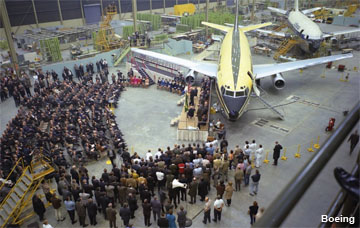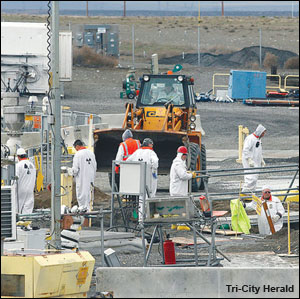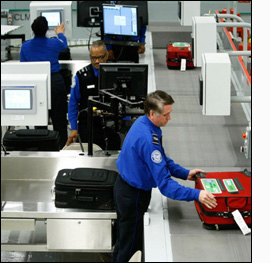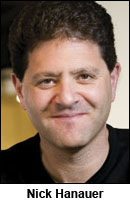NEWS ROUNDUP
UW Postdocs ratify ● Stand by Boeing ● Jon lets ’em have it ● Nick was wrong
Wednesday, June 12, 2019
LOCAL
► Via Twitter…
ALSO at The Stand — UW Postdocs reach tentative deal on historic first contract (May 31)
► From KUOW — Two Puget Sound Energy coal plants in Montana closing earlier than expected — Two Puget Sound Energy coal plants will close in December because of financial challenges. The two coal producing units are co-owned by PSE and Talen Energy and are part of the larger Colstrip, Montana power plant. Puget Sound Energy, Washington’s biggest electrical utility, gets an estimated 38 percent of its power from Colstrip’s plants. That comes from four coal facilities, the oldest two of which are now set to close.
BOEING
► From HuffPost — Boeing reports zero new plane orders for second straight month — Boeing has reported zero new commercial plane orders for May ― the second month in a row that the world’s largest plane-maker has announced such an abysmal order tally. Boeing’s order and delivery totals have plummeted since its 737 Max jet was involved in the deadly Lion Air and Ethiopian Airlines crashes.
 ► In today’s Seattle Times — Let’s stand with our Boeing neighbors in these trying times (Bob Drewel) — Providing the public with a safe and economical way to travel is at the heart of what Boeing and its 69,000 Washington employees do. Even as initial horror of the two crashes fade, the repercussions remain. Boeing’s leadership and workforce are grappling with the very real ramifications. They are hurting for the lives lost, and are working hard to identify and solve the problems. This is hard work on so many levels, with mechanical, engineering, process and management ramifications. There is tremendous pressure to move quickly, and just as much pressure to not make any mistakes. This isn’t a challenge borne by some far-off company; this is the work being done by our neighbors. It is time for support, not derision. Diminishing large corporations is a crowd-pleaser for many politicians; in fact, the love-hate relationship with large companies has a long history in American political rhetoric. But we should not be casual about the importance of Boeing and aerospace in our state.
► In today’s Seattle Times — Let’s stand with our Boeing neighbors in these trying times (Bob Drewel) — Providing the public with a safe and economical way to travel is at the heart of what Boeing and its 69,000 Washington employees do. Even as initial horror of the two crashes fade, the repercussions remain. Boeing’s leadership and workforce are grappling with the very real ramifications. They are hurting for the lives lost, and are working hard to identify and solve the problems. This is hard work on so many levels, with mechanical, engineering, process and management ramifications. There is tremendous pressure to move quickly, and just as much pressure to not make any mistakes. This isn’t a challenge borne by some far-off company; this is the work being done by our neighbors. It is time for support, not derision. Diminishing large corporations is a crowd-pleaser for many politicians; in fact, the love-hate relationship with large companies has a long history in American political rhetoric. But we should not be casual about the importance of Boeing and aerospace in our state.
THAT WASHINGTON
 ► In today’s Tri-City Herald — White House calls out Hanford cleanup spending. Trump may veto House budget bill. — White House officials are threatening a veto of a comprehensive spending bill, in part because of money included for cleaning up the Hanford nuclear reservation. A policy memo released by the White House Tuesday repeated the concerns of the Department of Energy Inspector General on “mismanagement, weak internal controls and fraud” at Hanford. The Democrat-controlled U.S. House is expected Wednesday to start considering the bill, which passed out of committee with more money for Hanford and other DOE cleanup programs than requested by the Trump administration.
► In today’s Tri-City Herald — White House calls out Hanford cleanup spending. Trump may veto House budget bill. — White House officials are threatening a veto of a comprehensive spending bill, in part because of money included for cleaning up the Hanford nuclear reservation. A policy memo released by the White House Tuesday repeated the concerns of the Department of Energy Inspector General on “mismanagement, weak internal controls and fraud” at Hanford. The Democrat-controlled U.S. House is expected Wednesday to start considering the bill, which passed out of committee with more money for Hanford and other DOE cleanup programs than requested by the Trump administration.
► In the Michigan Advantage — AFL-CIO president hosts NAFTA town halls in Michigan, Ohio, Pennsylvania — Trumka announced Tuesday that he will hold a series of town halls about “union members’ struggles under NAFTA, and what working people want to see from the administration’s proposed USMCA [United States-Mexico-Canada Agreement].”
ALSO at The Stand — Making sense of NAFTA and its replacement (by Stan Sorscher)
► BREAKING from The Guardian — Trump asserts executive privilege over 2020 census documents sought by Democrats — The documents sought relate to the decision to insert a citizenship question, which the census bureau itself acknowledges will reduce participation.
► From the Federal News Network — NIFA employees vote to unionize on heels of USDA relocation — Employees at a second Agriculture Department subcomponent on Tuesday have overwhelmingly voted to unionize amid the agency’s plans to relocate the National Institute of Food and Agriculture and the Economic Research Service out of the national capital region. NIFA employees voted 137 to 2 to unionize under the American Federation of Government Employees.
TODAY’S MUST-SEE
► From CBS News via YouTube — Former “Daily Show” host and activist Jon Stewart gave emotional testimony Tuesday expressing his anger with Congress for not addressing 9/11 first responders’ health issues. Watch the whole thing.
NATIONAL
 ► From The Guardian — Delta workers seeking to unionize say they are ‘under siege’ by management — A Guardian investigation has revealed workers at Delta have reported threats, intimidation and a barrage of anti-union sentiments from management as workers seek to form a union with the International Association of Machinists and Aerospace Workers (IAM). Delta workers described break rooms, bathrooms and daily group briefings as loaded with anti-union content from Delta. Televisions in break rooms play anti-union videos, in addition to posters and flyers containing anti-union material. “Workers who are pro-union are essentially under siege,” one organizer said. “We just want Delta to back off and allow Delta workers to exercise their rights so we can get a vote and settle the question.”
► From The Guardian — Delta workers seeking to unionize say they are ‘under siege’ by management — A Guardian investigation has revealed workers at Delta have reported threats, intimidation and a barrage of anti-union sentiments from management as workers seek to form a union with the International Association of Machinists and Aerospace Workers (IAM). Delta workers described break rooms, bathrooms and daily group briefings as loaded with anti-union content from Delta. Televisions in break rooms play anti-union videos, in addition to posters and flyers containing anti-union material. “Workers who are pro-union are essentially under siege,” one organizer said. “We just want Delta to back off and allow Delta workers to exercise their rights so we can get a vote and settle the question.”
ALSO at The Stand — From insulting to illegal: IAM files charges against Delta Air Lines (May 20, 2019) — Headquartered in the “right-to-work” state of Georgia, Delta has aggressively fought off efforts by its employees to unionize as it has expanded outside the anti-union South, including to Seattle.
 ► In today’s Washington Post — Your airport security line could get longer next year — and TSA officers are not a happy crew (by Joe Davidson) — Just in time for the summer travel season comes word that the folks who help keep our skies safe are short-staffed, poorly paid and suffer meager morale… “Higher compensation is an important part of the puzzle,” Lance Lyttle, managing director of the Seattle-Tacoma International Airport, told the subcommittee hearing. Citing the airport’s own security screeners, who staff checkpoints for airport employees and earn more than the federal officers, he added, “We have very little turnover in those jobs.”
► In today’s Washington Post — Your airport security line could get longer next year — and TSA officers are not a happy crew (by Joe Davidson) — Just in time for the summer travel season comes word that the folks who help keep our skies safe are short-staffed, poorly paid and suffer meager morale… “Higher compensation is an important part of the puzzle,” Lance Lyttle, managing director of the Seattle-Tacoma International Airport, told the subcommittee hearing. Citing the airport’s own security screeners, who staff checkpoints for airport employees and earn more than the federal officers, he added, “We have very little turnover in those jobs.”
► From Labor Notes — On eve of union vote, Chattanooga VW workers describe rampant workplace injuries — “I’m only 33 and I can’t see myself working here for another 10 years,” said Ashley Murray. “I would be disabled by then. We need a union because they are a multibillion-dollar company and they treat us like shit.” Murray works at the Volkswagen plant in Chattanooga, Tenn., one of 18 hourly employees there I interviewed for this story. Comments like hers were almost universal. According to these workers, on-the-job injuries are among the top issues at the sprawling plant. The union authorization election runs Wednesday through Friday this week; 1,700 workers are eligible to vote.
► From Art Forum — Workers at NY’s Guggenheim Museum move to unionize
► From the AP — States sue to stop $26.5 billion Sprint, T-Mobile deal
 ► From the AP — U.S. makes emphatic arrival at Women’s World Cup with record-breaking 13-0 rout of Thailand
► From the AP — U.S. makes emphatic arrival at Women’s World Cup with record-breaking 13-0 rout of Thailand
► In today’s Washington Post — The U.S. women’s national team is an American treasure. Pay them a bounty. (by Sally Jenkins) — Just imagine how that record-setting 13-0 victory over Thailand will play at a jury trial. It’s going to be a lot of fun watching lawyers for the soccer federation try to justify why the U.S. Women’s National Team, with their air rifles for legs, are paid 38 cents on the dollar compared to their male counterparts and had to sue for fair wages. It’s going to be pure entertainment listening to federation president Carlos Cordeiro stammer out an explanation on the witness stand of why this team, which is nothing short of an American damn treasure, isn’t worth equal coin to a men’s squad that can’t beat Jamaica.
TODAY’S MUST-READ
 ► From The Atlantic — Better public schools won’t fix America (by Nick Hanauer) — Like many rich Americans, I used to think educational investment (and charter schools) could heal the country’s ills — but I was wrong. Fighting inequality must come first. For all the genuine flaws of the American education system, the nation still has many high-achieving public-school districts. Nearly all of them are united by a thriving community of economically secure middle-class families with sufficient political power to demand great schools, the time and resources to participate in those schools, and the tax money to amply fund them. In short, great public schools are the product of a thriving middle class, not the other way around. Pay people enough to afford dignified middle-class lives, and high-quality public schools will follow. But allow economic inequality to grow, and educational inequality will inevitably grow with it.
► From The Atlantic — Better public schools won’t fix America (by Nick Hanauer) — Like many rich Americans, I used to think educational investment (and charter schools) could heal the country’s ills — but I was wrong. Fighting inequality must come first. For all the genuine flaws of the American education system, the nation still has many high-achieving public-school districts. Nearly all of them are united by a thriving community of economically secure middle-class families with sufficient political power to demand great schools, the time and resources to participate in those schools, and the tax money to amply fund them. In short, great public schools are the product of a thriving middle class, not the other way around. Pay people enough to afford dignified middle-class lives, and high-quality public schools will follow. But allow economic inequality to grow, and educational inequality will inevitably grow with it.
 We have confused a symptom—educational inequality—with the underlying disease: economic inequality. Schooling may boost the prospects of individual workers, but it doesn’t change the core problem, which is that the bottom 90 percent is divvying up a shrinking share of the national wealth. Fixing that problem will require wealthy people to not merely give more, but take less.
We have confused a symptom—educational inequality—with the underlying disease: economic inequality. Schooling may boost the prospects of individual workers, but it doesn’t change the core problem, which is that the bottom 90 percent is divvying up a shrinking share of the national wealth. Fixing that problem will require wealthy people to not merely give more, but take less.
The Stand posts links to Washington state and national news of interest every weekday morning by 10 a.m.






